Philosophy and Religious Studies
- Army ROTC
- Women's & Gender Studies
- School of Communication
- Interdisciplinary Humanities Research Lab
- Wicked Initiatives
- Department of English
- Interdisciplinary Studies
- Philosophy and Religious Studies
- Department of Criminal Justice
- Foreign Languages and Literatures
- Psychology
- SMART Lab
- Law
- Department of History
- Department of Political Science
- Center for Police Practice, Policy and Research
- Sociology
Jots and Tittles (vol. 4, no. 2)

December 2020
Not a Creature Was Stirring

Radford University's campus decorated for the winter holidays.
After making it through what was perhaps the most unusual Fall semester ever, Radford’s campus has emptied and the corridors in CHBS are quiet until January. We in the Department of Philosophy and Religious Studies (PHRE) are thankful to everyone who helped our students and colleagues press on, and we wish a restful and restorative winter break to all.
If you’re considering course registration for the Spring 2021 semester, if you have questions about PHRE curriculum, our major and minor programs, or about the department, reach out to Dr. Paul Thomas, Professor of Religious Studies and chairperson of the Department of Philosophy and Religious Studies: pthomas15@radford.edu.
Student Spotlight
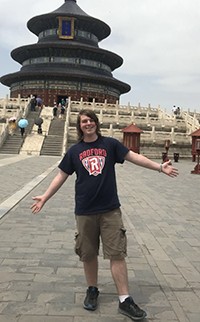
Jots and Tittles caught up over email with Nathan Collins—a fourth-year PHRE major concentrating in Religious Studies—to learn about his experiences studying in the department.
What attracted you to the philosophy and religious studies major?
For my first two years I was really unsure of what I wanted to do. I have always been interested in different cultures, especially Asian cultures so I decided to study abroad in China and Japan. It was while I was studying abroad that was able to interact with different religions and cultures, and found myself wanting to learn more about these religions and others around the world, so when I returned to Radford, I decided to declare my major.
How has taking philosophy and religious studies courses benefited you?
Philosophy and religious studies courses have benefitted me by helping me think about life in new ways. We are able to learn about topics that I feel can benefit everyone to think about, but are not addressed in other courses, like ideas about death and what it means to live. It also gives me the chance to learn about religions and cultures from around the world. This is important for me because I hope to work abroad in the future.
Which classes have been among your favorites?
My favorite classes that I have taken would be American Sects and Cults with Dr. Thomas and Religion and Death with Dr. Rothgery. I am also looking forward to Dr. Jordan's Religions of China and Japan class next semester because of my interest in East Asian religions.
What do you plan to do after college?
After college I plan on going back to Japan by joining the JET Program. Through this program I will be teaching English at schools in Japan. I believe the philosophy and religious studies major will be useful because it has helped me better understand how to interact with other people and especially be understanding of different religions and cultures.
Why should students consider a major or minor in philosophy and religious studies?
Students should consider a major in philosophy and religious studies because it lets students look at how people from around the world live their lives and presents opportunities to better understand other cultures and to travel. The classes also cover very interesting and unique topics which can be beneficial and enjoyable for anybody.
PHRE thanks Nathan for reflecting on his experiences in the department and sharing them with the Highlander family. If you have stories or insights about the ways that PHRE has impacted your life, reach out to Dr. Paul Thomas and let us know! pthomas15@radford.edu.
Faculty Spotlight on Research
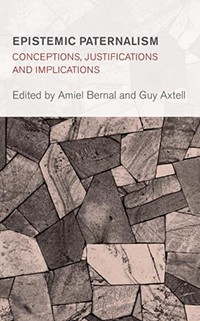
In June 2020, Rowman and Littlefield published Epistemic Paternalism: Conceptions, Justifications, and Implications, a collection of essays co-edited by philosophy professor Dr. Guy Axtell and former philosophy faculty, Dr. Amiel Bernal. Below, Dr. Axtell shares about the book’s project and his broader research agenda.
Recently you collaborated with former PHRE faculty member Amiel Bernal to publish a collection of essays titled Epistemic Paternalism: Conceptions, Justifications, and Implications. Can you tell us about the concept of epistemic paternalism and what drew your interest to this topic?
“Paternalism” is the idea of “nudging,” or manipulating, or coercing the behavior of others for their own good, but without their explicit consent. Seat belt and helmet laws are classic examples of paternalistic laws which constrain people “for their own good,” and the ethics of paternalistic laws have long been debated in ethics and political thought. What differentiates issues of “epistemic” paternalism from paternalism of this more general sort is that it does not revolve around interfering with people’s actions, but with how they inquire, and how information is packaged and distributed.
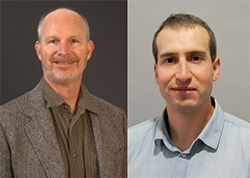
Some of our students know Amiel, who was a lecturer in our department for several years as he earned his Ph.D. in the ASPECT program at Virginia Tech. We found that his dissertation topic and my own growing interests in value theory (ethics, politics) congealed, and the idea came up for us to do a collection where not just philosophers, but scholars from other fields could contribute. We received submissions focusing on medical paternalism in the doctor-patient relationship, on the paternalistic policies of Facebook to tag or remove misinformation, on the ethics of Big Data, science communication and other topics.
We found a home for the collection in a book series edited by James (Jim) Collier, who teaches in VT’s Science, Technology & Society program. Amiel has recently moved on to another teaching job in his home state of Colorado, but it was a good collaboration with input between faculty and graduate students at the two local colleges in the New River Valley.
Another Tech grad student, Shaun Respess, contributed a chapter on medical paternalism. This gives you a good sense of the issues of epistemic paternalism as they pertain to medical treatment. He draws our attention to what it means for a doctor to have proper care for a patient, and points out that we need to consider not just that particular relationship, but how information is (and ought to be) curated and presented, in broader networks or ecosystems of knowledge. If a doctor conceals particularly unpleasant test results from a patient, or presents certain treatment options to patients but not all available options, they may be aiming to promote their patient’s health but are doing so in a paternalistic manner. They are putting their own judgment ahead of their patient’s autonomy by the way they organize and disseminate the relevant medical information. When might their expertise justify this? When, instead, should the autonomy of the individual take precedence?
Tell us a bit about how your research projects relate to how and what you teach. What can Radford University students learn from puzzling through issues like epistemic paternalism?
If you just take the example of the Senate hearings with the Facebook and Twitter CEO’s this past November, you really see concerns with epistemic paternalism on the political stage. That it was such a politicized stage should concern us all. Watching those hearings, I felt that the Senators made a complete political football of the filtering and tagging policies these social media platforms employ on posts. Mark Zuckerberg and Jack Dorsey seemed caught between a rock and a hard place in responding to the Senators, some of whom demanded a more stringently paternalistic policy of removing or labeling “fake news” and “misinformation,” while others from across the aisle insisted that no one has the right to tag the President’s tweets, and that their doing so made clear a strong liberal bias. There was simply no chance of their satisfying both sets of critics, left and right! In a nutshell, if the one party’s Senators got their way our Constitutionally guaranteed freedom of speech are potentially undercut, while if the other party got their way, these companies would potentially find their hands tied and able to do little or nothing to combat extreme speech, including hate speech.
So here are some of the issues social epistemologists are concerned with, displayed in what USA Today described as a ‘techlashing,’ but which scholars often talk about in terms of “gatekeeping.” So, ask yourself: Are media sites like Facebook permitted to paternalistically tag or remove ‘fake news’ or extreme content? Should they be expected to have policies to filter out certain potentially harmful content, and to remediate the ill-effects of “echo chambers” where biased and polarized ideologies are fostered? If you think that their having such a policy is in our collective best interest, and needs to a perennial part of the internet information environment, then you believe there is at least some justified epistemic paternalism.
In the book’s introduction, co-authored with Bernal, you mention that the book emerged from curiosity about the relationship between social epistemology and factors that facilitate democratic systems. Can you describe some of the main insights about knowledge, freedom, or other themes that emerge in the volume?
In our Introduction to the volume, we point out that care and control are sometimes entangled, such that it’s difficult to determine the real motivation. In the medical information case, one might justify the doctor’s paternalistic “nudging” on the basis of their care for the patient. But the doctor’s behavior could also be described as manipulative. That is a tension that most or all of the chapters address: The need for not stepping over that line from care (as justice) to overt control of others (as an injustice). There isn’t a consensus that the contributors come to: some think we ought to use psychology to design smarter “choice architectures” which help people overcome their biases and to promote shared civic virtues; others would describe these designs as a subversion of democratic decision-making in favor of hierarchical control: its rationale is “epistocracy,” or rule by experts. But this entanglement of care with potentially over-weaning control is a constant theme, and each writer examines how that line of demarcation can be negotiated in a different profession.
What’s next on your research agenda?
I’m finishing a chapter for an edited collection on The Moral Psychology of Amusement. It is fun to deal with popular culture – games and other popular amusements. I try to show how both amusements can function to stoke the fires of moral imagination, and how classically and today they help foster emotional healing, and “emotional intelligence.” I am also planning to take these interests further in a project for a book of very short stories drawn from all over the world, dealing with life’s dilemmas. Each story in some way bears upon our intellectual virtues and vices, and how we deal with uncertainties, risks, or cultural-religious differences. Each story will come with a short lesson plan to make it a useful focus in brief group meetings, live or virtual. The overall theme is optimism about cooperative problem-solving, in contrast to the zero-sum thinking which threatens to lead us into a “tragedy of the commons.” We need trust in the benefits of cooperation in the world today, and the critical thinking skills to go with it, in order to protect our commons, our forests, ocean fisheries, and other natural resources that might otherwise be exploited through short-term thinking. It should be a fun project, and one that I have proposed through OURS to have students some students help collaborate on.
Amiel Bernal and Guy Axtell, editors, Epistemic Paternalism: Conceptions, Justifications, and Implications, Collective Studies in Knowledge and Society (Rowman and Littlefield, 2020). ISBN 9781786615732, $120 Hardcover, 332 pages.
The Good Fruits of PHRE
In addition to co-authoring an article on pandemic ethics and politics with Heather Keith (RU’s Executive Director of Faculty Development) titled “Out of Plumb, Out of Key, and Out of Whack: Social Ethics and Democracy for the New Normal,” Steven Fesmire has recently published peer-reviewed articles on racial justice (“On (Not) Becoming a Moral Monster: Democratically Transforming American Racial Imaginations”), climate ethics (“Pragmatist Ethics and Climate Change”), and ethical theory (“Dewey’s Independent Factors in Moral Action”).
Faculty Spotlight on Teaching
During the 2020–2021 academic year, PHRE is launching a completely updated set of learning experiences for Radford University students, with new and revised courses, updated requirements in our major concentrations and minors, and two new minor programs.
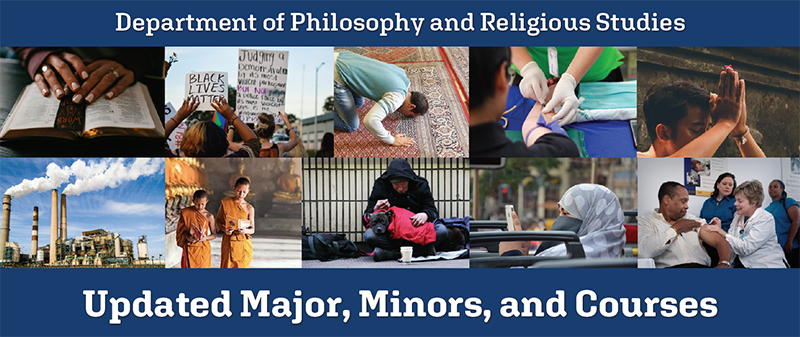
PHRE is rolling out a comprehensive update of all courses and programs. Faculty members streamlined requirements and updated courses to address topics that matter in the world today.
PHRE offers one major (30 credits) with two concentrations—either Philosophy or Religious Studies—and offers four different minor pogroms (15 credits each), in Philosophy, in Religious Studies, and two new minors, one in Ethics and a fully online minor in Religious-Cultural Literacy for Healthcare Professions.
All of PHRE’s programs allow students to explore the deep questions of what it means to be human while gaining skills to address complex problems, think analytically, and collaborate across social and cultural differences.
To learn more about PHRE’s programs, visit the following links:
- PHRE home page
- Overview of all PHRE major and minor programs
- Descriptions of all PHRE courses (click “Courses” in the left-hand-side menu)
- PHRE course offerings for Spring 2021
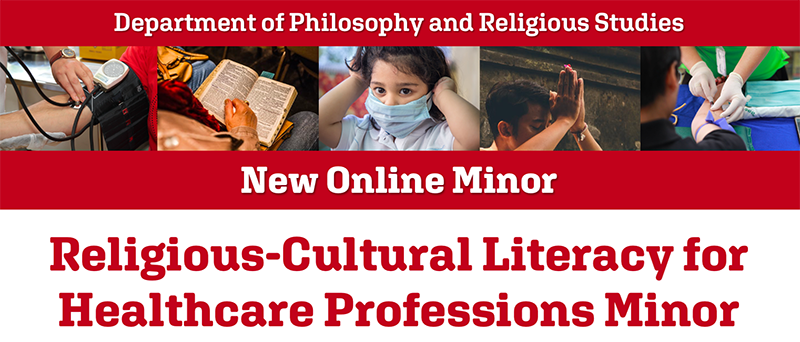
Taking an innovative new direction, PHRE is offering a fully online, 15-credit minor that links study of world religions with preparation to enter the healthcare professions.
PHRE’s Religious-Cultural Literacy for Healthcare Professions Minor (RCL) will prepare future healthcare workers with cultural competence in religious diversity. Designed to supplement majors in the health sciences and human services, the RCL Minor helps students satisfy curiosity about the humanities and gain relevant knowledge and skills for professional life.
Through 5 online courses, RCL students explore religion and understandings of health; the relevance of religious information to healthcare and medicine; methods for interacting with diverse religious populations in clinical and administrative settings; and critical reflection on religion’s role in the organization, delivery, and management of healthcare.
Students can start exploring the RCL Minor in Spring 2021 by enrolling in Dr. Thomas’s course, RELN 112-07 (CRN 24201) World Religions: Healthcare, or enrolling in Dr. Pollick’s course, RELN 213-01 (CRN 24211), Healthcare and the American Religious Landscape.
Have questions about healthcare and religion? Email Dr. Thomas (pthomas15@radford.edu) or Dr, Pollick (gpollick@radford.edu).
Philosophy and Religious Studies in the News

Kwame Anthony Appiah considers the role played by personal experiences in crafting political arguments, in “Why Are Politicians Suddenly Talking about Their ‘Lived Experience’?” The Guardian, Nov. 14, 2020.

James Estrin’s photo essay, “Staying Apart, But Praying Together,” (New York Times, Nov. 15, 2020) documents how some religious communities are continuing to respond to changed configurations imposed by the COVID-19 pandemic.

At the Daily Nous (Nov. 10, 2020), Justin Weinberg assembles a wide range of philosophical responses to the November 2020 U.S. elections, in “Philosophers on the 2020 U.S. Presidential Election.”
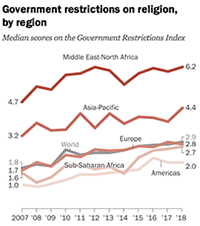
Quantitative researcher Samira Majumdar summarizes the results of a recent study that examined governmental curtailments of religion, in “Government Restrictions on Religion around the World Reached New Record in 2018” Fact Tank: News in the Numbers (Pew Research Center), Nov. 10, 2020.